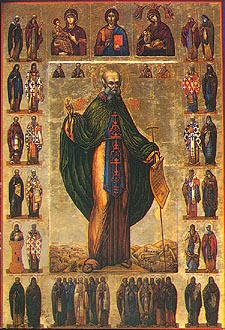Venerable Savva the Sanctified

Saint Savva the Sanctified was born in the fifth century at Cappadocia of pious Christian parents, John and Sophia, and his father was a military commander. Journeying to Alexandria on military matters, John and Sophia left their five-year-old son Savva in the care of an uncle. When the boy was eight years old, he entered the nearby Monastery of Saint Flavian. The gifted child quickly learned to read and became an expert on the Holy Scriptures. His parents urged Saint Savva to return to the world and enter into marriage, but all in vain.
When he was seventeen years old he was tonsured as a monk, and attained such perfection in fasting and prayer that God found him worthy of the gift of working miracles. After spending ten years at the Monastery of Saint Flavian, he went to Jerusalem, and from there to the Monastery of Saint Euthymios the Great (January 20). Saint Euthymios, however, sent the young man to Abba Theoktistos, the head of a nearby monastery with a strict cenobitic Rule. Saint Savva lived in obedience at this monastery until the age of thirty.
After the death of Elder Theoktistos, his successor blessed Savva to seclude himself in a cave. But on Saturdays, he left his hermitage and came to the Monastery, where he took part in the Divine Services and ate with the brethren. After a certain time, Saint Savva received permission not to leave his hermitage at all, and he struggled in the cave for five years.
Saint Euthymios directed the young monk's life, and seeing his spiritual maturity, he began to take him to the Rouba wilderness with him. They left on January 14, and remained there until Palm Sunday. Saint Euthymios called Saint Savva a Child-Elder, and encouraged him to grow in the monastic virtues.
When Saint Euthymios fell asleep in the Lord (+ 473), Saint Savva withdrew from the Lavra and moved to a cave near the monastery of Saint Gerasimos of Jordan (March 4). After several years, disciples began to gather around Saint Savva. As the number of monks increased, a Lavra sprang up. Guided by a pillar of fire which appeared before him as he was walking, Saint Savva found a spacious cave in the form of a church.
The holy Elder founded several more monasteries. Many miracles took place through his prayers: at the Lavra, a spring of water welled up, during a time of drought there was abundant rain, and the sick and those possessed by demons were also healed. Saint Savva composed the first monastic Rule of Church Services, the “Jerusalem Typikon," followed by all the Palestinian monasteries. The Saint surrendered his soul to God in the year 532.
Saint Savva is depicted holding a scroll which reads: "He who loves God disdains corruptible things, and prefers the knowledge of Him."
